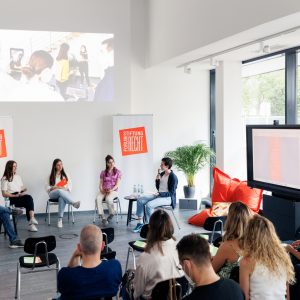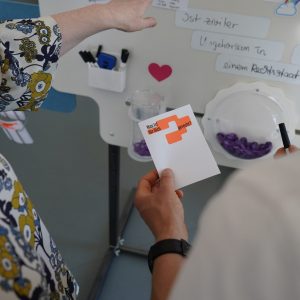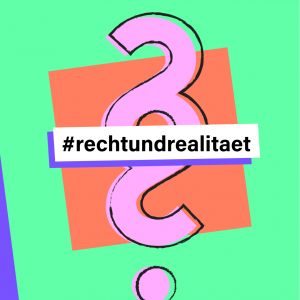Justice, Literature and Remembrance
An evening with Bernhard Schlink and Philippe Sands, moderated by Géraldine Schwarz
The reading room of the Academy for European Human Rights Protection at the University of Cologne was filled to capacity when Philippe Sands and Bernhard Schlink came to talk about justice, literature and memory last Wednesday, 5 July 2023.
Both are writers. Both have published bestsellers. Both have gained international acclaim through the film adaptations and translations of their works, among other things. And, what made this evening so special: both are lawyers!
Philippe Sands, an expert on international law, has appeared as a lawyer before international courts such as The Hague, the European Court of Human Rights and the International Tribunal for the Law of the Seas.
Bernhard Schlink was Professor of Public Law, Social Law and Philosophy of Law at various universities in Germany and the USA. He was also a judge at the Constitutional Court of North Rhine-Westphalia in Münster for almost 20 years.
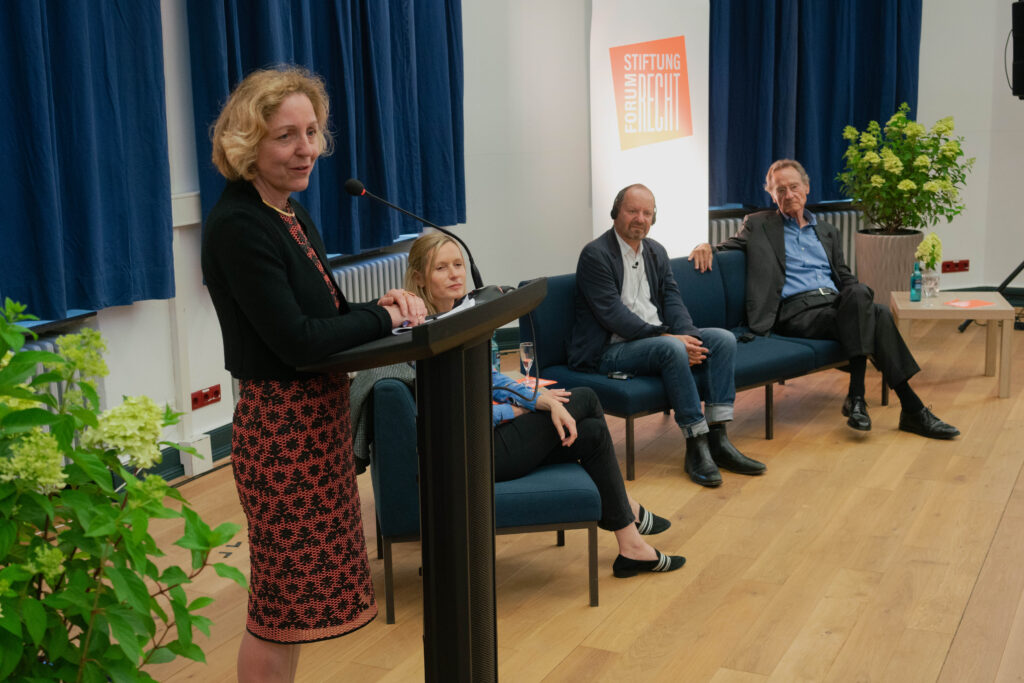
Iustitia meets author
In addition to the two authors, the Franco-German journalist Géraldine Schwarz has also been invited to take part in the evening. In her own literary and cinematic work, including “Les Amnèsiques/Die Gedächtnislosen”, Schwarz addresses the often painful – and frequently neglected – reappraisal of the past and pleads for a new approach to remembrance work. As the evening’s moderator, Géraldine Schwarz impresses in this role and presents herself as a challenging dialogue partner.
Schwarz guides the audience through the evening for more than two hours and offers plenty of room for questions and an open discussion.
The first topic is the tense relationship between court proceedings and justice on the one hand and remembrance and reparation on the other. To what extent can a guilty verdict erase the suffering and trauma experienced or even exonerate from guilt?
Bernhard Schlink dedicated the world bestseller “The Reader” to Germany’s guilt over the past: according to the author, the failure to come to terms with the crimes of National Socialism, the Holocaust and the perpetrators as a “second guilt” of the people after 1945 “preoccupied his entire generation”.
People and nations share secrets, things that are not talked about, says Sands. He himself is fascinated by the gap that arises when people or nations avoid coming to terms with reality. His research “The Rat Line” symbolises this gap and reflects a universal story on a small scale.
“Who do we get to talk about justice?” (Sands)
Later, the discussion focusses on the limits and potential of literature and legal proceedings in coming to terms with the past – for example in dealing with the consequences of crimes, dictatorship or conflicts. It was interesting to hear the views of two lawyers who write – how do they assess their own influence through their literary work? Both agreed that literature can make a major contribution to coming to terms with the past. For them stories, documentaries and the description of individual fates open doors because they offer a neutral space for different perspectives.
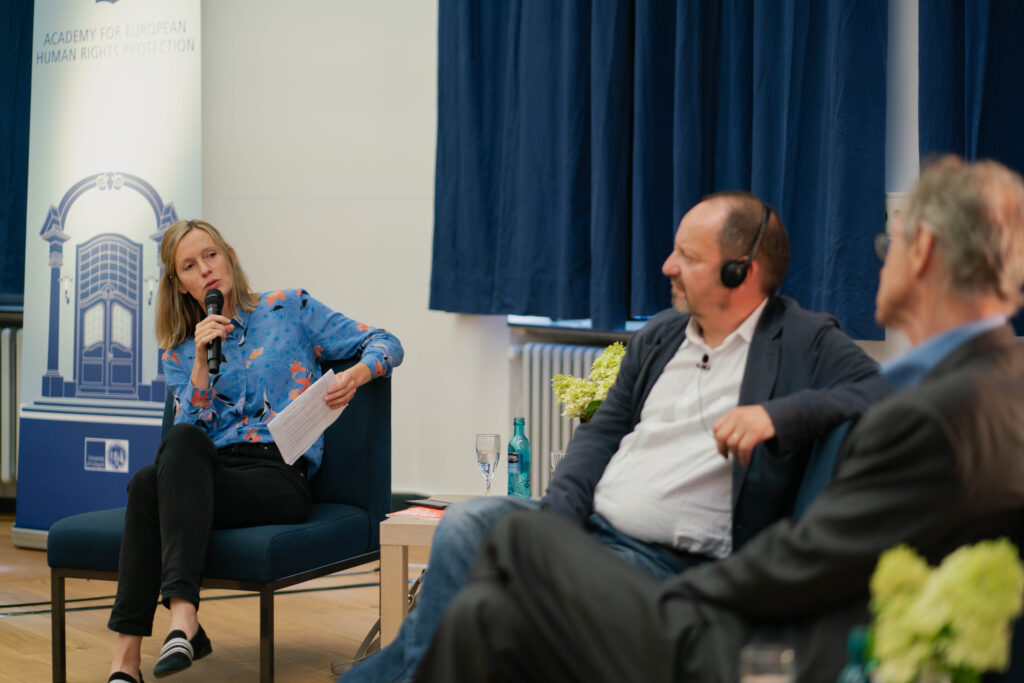
And from the perspective of the recipients: Courts interpret right and wrong, provide guidance for civil coexistence. Books make room for what was, what would have been, what could have been – without having to judge.
According to Schlink, the law supports both remembering and forgetting. Both can be traumatic. It is therefore important to ask ourselves: What can the law achieve? How do we want to remember past injustice?
Court proceedings play a decisive role in the process of making amends, Sands continues. And since more people read novels than court judgements, it is important to reflect on how literature and jurisprudence can be combined: “What is the relationship between a trial and a novel?”
Sands, born in London to a Jewish immigrant family, followed the traces of his ancestors for his work “My Lviv” (2016) and combined them with the story of two lawyers who had a decisive influence on modern international law. In contrast to non-fictional texts, fiction has the ability to make the past accessible to readers through personal connections and to open the door to complex jurisprudence, according to Sands. He was Chairman of English PEN from 2018 to 2023 and this also underlines his stance: it is important to write about justice! Trials are only one aspect of this. However, the principle of truthfulness applies and authors must not ignore historical sources, Bernhard Schlink adds.
Géraldine Schwarz skillfully links the authors’ biographies, especially their legal careers, with their oeuvre. Even if it is not a reading, the audience will gain an insight into their current prose work.
In his exploration “The Ratline” Philippe Sands outlines the flight of a SS officer before his sentencing. Sands bases his work on the family’s private letters and diaries as well as on coversations with Otto Wächter’s son.
Bernhard Schlink’s narration “Die Enkelin” also deals with a story of flight and the reasons and personal consequences of this decision – even though under drastically different circumstances:
„Ich schreibe nie, weil ich über ein Thema schreiben will. Ich schreibe Geschichten, die zu mir kommen und bei mir bleiben, mit denen ich mich beschäftige und bei denen ich mich dann entschließe, ich möchte sie schreiben.”
Bernhard Schlink
Schlink’s protagonist, Birgit, flees to West Germany for love and sacrifices a life together with her daugther. Similar to Sands work, Schlink bases his book on historical research. The narrative arch reaches from the past to the present and his protagonists have to wrestle with differing wolrd views.
The event was convened in German and English. The Law Forum Foundation (Stiftung Forum Recht) and Academy for European Human Rights Protection at the University of Cologne jointly organised the evening (academy-humanrights.uni-koeln.de)
We want to thank the direktor Angelika Nußberger and her team for a fruitful collaboration.
You’ve missed this event? Join us for our next one. You can find all upcoming dates in our calender: stiftung-forum-recht.de/veranstaltungen. Please note, that we currently only translate information on events into English which are held in English. Please contact us if you have any questions or concerns joining an event in German.

